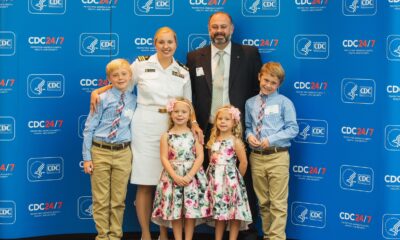Around Atlanta
A conversation with Aarti Tandon about the Smart City Expo Atlanta
Published
6 years agoon
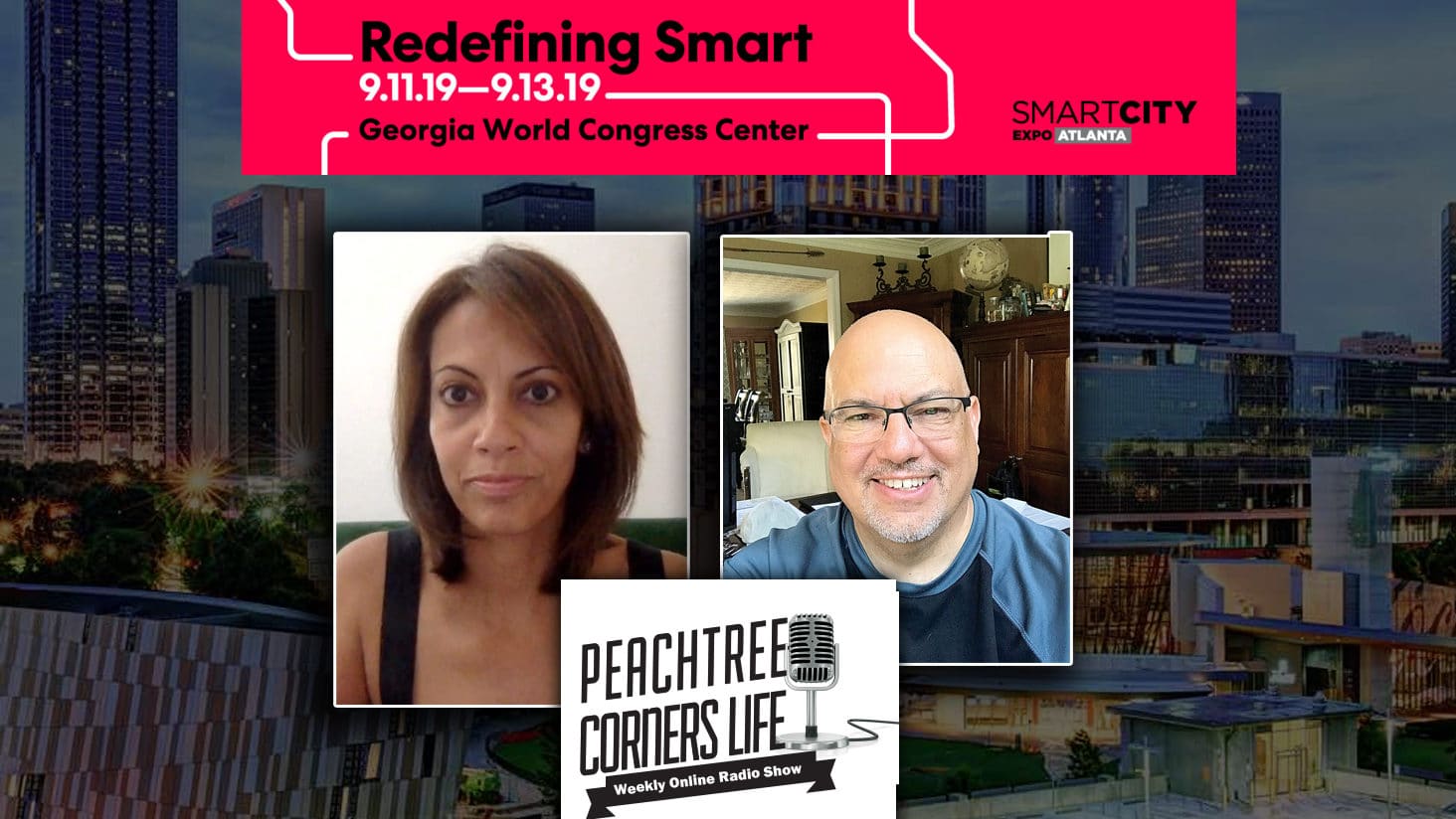
With the first Smart City Expo Atlanta coming up in less than two weeks, Rico sits down with Aarti Tandon, the CEO, and co-founder of the expo. Aarti talks about how they’re striving to redefine “smart” by bringing in the human aspect of innovation into their event. By bringing in younger generations, people from the public and private sector, CEOs of corporations to mayors to non-profits, Aarti shares how the United States’ first Smart City Expo will instigate essential conversations and dialogue about what the future of technology is, how its applications can impact cities, and how we all can reframe our mindset towards “smart” technology.
Resources
SmartCityExpoAtlanta.com
Email: info@smartcityexpoatlanta.com
Facebook: https://www.facebook.com/pg/SmartCityATL/photos/?tab=album&album_id=310784826476114
Instagram: @smartcityatl
Twitter: #SCATL19
“The conversation is so comprehensive. It’s micromobility, but it’s also building a workforce that’s not just the future of work, but how do you build dignity into the future of work. We talk about economic mobility. I think for us, in reframing the narrative, we want to talk about not just autonomous, electric and micromobility. We want to talk about social mobility, economic mobility. We want to talk about human capital alongside venture capital. And we want to make sure the infrastructure is equitable while it’s intelligent.”
Aarti Tandon, the CEO, and co-founder of smart city expo atlanta
Transcript of the podcast:
Rico [01:26 ]: Hi, this is Rico Figliolini, host of Peachtree Corners Life, a podcast that’s centered here in the city of Peachtree Corners, just north of Atlanta. The city of Atlanta that’s gonna be hosting, for the first time, the Smart City Expo Atlanta, which is an offshoot – it’s the US edition of the Smart City Expo World Congress that’s hosted every year since 2011 in Barcelona. And over the years, they’ve expanded to other cities like Brazil, Turkey, Japan, Mexico, Argentina – other countries – and this is the first time in the United States. So, what I want to do is bring on Aarti Tandon, who’s the cofounder of the Smart City Expo. So let’s bring her on. Hey Aarti, how are you?
Aarti [02:13 ]: Hi Rico, thanks for having me!
Rico [02:15 ]: No, this is great. I appreciate you bearing with me for the technical difficulties we were having before. But thank you for coming on.
Aarti [02:25 ]: My pleasure.
Rico [02:27 ]: So tell us a little bit about Aarti. Tell us who you are and how you got to Smart City Expo and stuff. Give us a brief.
Aarti [02:35 ]: Thank you for asking. So, I’m actually lawyer by trade, and many years ago, I was working in entertainment and after that, working at a project for a client of mine who was serving 14 years in federal prison. And I really understood what, at that time – how do we actually, really build an inclusive economy. I spent five years working pro bono for this case, and President Bush had granted a commutation to my client in 2008, and since then, I’ve been really trying to understand, you know, how do we use sports, entertainment and marry it with justice. I went on to produce a bunch of films, and then, in 2000, or actually probably three years ago, I was asked to be the executive director of Smart City New York. And in that process, I really wanted to talk about what makes a city smart. And sort of redefine the term. And we ended up having 2000 people from over 80 countries – over 30 countries. But we had the CEOs of UNICEF and Robin Hood and Boys and Girls Club in conversation with the Mastercards and the Microsofts. And we really felt that everyone had to have a seat at the table if we were going to make sure we had an inclusive, 21st century economy. And so last year, Mayor Bottoms was at our conference and I established a relationship with Vera, and we had decided, you know, she had a focus on developing strong Smart City strategy, and Atlanta would be an ideal place to host the first Smart City Expo World event in the US.
Rico [04:15 ]: So you were in – you helped run the Barcelona event, then?
Aarti [04:19 ]: No, I ran a separate New York event. It was just a Smart City conference.
Rico [04:24 ]: Oh, okay. So this is the big expo then.
Aarti [04:26 ]: This is the big one. Yeah. This is really exciting. So Smart City Expo World Congress, which is the original temple event that’s happened since 2011 in Barcelona, 20,000 people attend. It’s basically the CES for cities. And what’s interesting about it is that, the rest of the world has really been focused on smart city strategy. So when you think about actually countries that have had conflict, they’ve leapfrogged into the future because they didn’t have legacy issues to deal with that we have in the United States. And so they’re deploying all sorts of incredible work in Estonia and Kosovo and Rwanda. And so Smart City Expo World Congress has been convening these thought leaders since 2011.
Rico [05:12 ]: So, with the mayor of Atlanta talking – sort of getting it set up here in Atlanta. Now – you’re gonna – eventually it’s gonna be a three-year deal on this one.
Aarti [05:25 ]: Yeah. We – our goal is to really plant ourselves in Atlanta, right? That’s the temple event for the United States. And it’s hosted in Atlanta, but it’s actually a national event. And part of the reason for that is because a lot of the people from the public sector in the US can’t justify, or really afford, sending their CIOs to Barcelona. And so they’re missing out on a lot of the sharing of best practices that are happening, especially, you know, the Nordic countries are so ahead of us on circular economy and sustainability. People are working on cyber around the world. And so we really, genuinely felt that this conference is a national conference. And if you’re a CIO from South Dakota or Minnesota, you have the same challenges that most cities do, and we’d love to have them come and learn.
Rico [06:16 ]: So, and if I understand correctly too, there is – smart city is not just about corporations or upper or middle class people that can afford an iPhone ring or something like that. It’s really bringing it to an equitable position, right? All the people on the street, if you will, can feel the effects of a smart city. That’s what this theme is, I guess, for Atlanta?
Aarti [06:42 ]: Yeah. So our theme is – let’s redefine the term ‘smart’. People ask me all the time – the most inevitable question is, “What is a smart city?” And I did a presentation for the state department a few weeks ago, and my response was, increasing quality of life. And so, what does that mean? How do you use the data to increase quality of life? So my dear friend, the mayor of Helsinki – he says his goal is to give every citizen one hour back in their day. And if you come from that premise, right – you think about – so if you knew your train was gonna be 20 minutes late, you may take a bus, you may take a bike, you may do something else, right? So how you make those choices so you can go home and spend more time with your family? And that’s how we look at what makes a city smart is how we’re deploying the technology. I’d love to just give you a few examples. I know you’ve got a bunch of questions. So, NYU Langone, and he’s gonna be one of our speakers, Dr. Gorovich, did a study on population health, and the health of cities. So it’s affordable housing, transportation, the actual health. In a few cities, and one of the cities was Providence, Rhode Island, I believe. Again, we have 250 speakers, so if I’m missing something let me know. But one of the things he realized was absenteeism was a really big issue in Providence. So what do you do with that data? Well, the mayor ended up putting washing machines in the public schools, right? That is how you create equity. That is where you say, we’re gonna give every child the opportunity to learn, and we don’t want them to be ashamed that they can’t come to school, and we’re gonna make sure that they have a safe environment from which they can prosper. That to us is equity. Other examples of that are – you know, there are all these amazing energy-generating pavements that are being used in stadiums and universities. So you generate energy off of the foot traffic. Well, why don’t we put that on a basketball court in the Bronx? You want people to understand what the 21st century is gonna look like, and they think it’s robots and they think it’s automation. It’s also – let’s meet people where they are, and that’s how this conference is designed. And that’s why we’re redefining the term smart.
Rico [09:02 ]: That’s cool. Because lots of people think it’s Amazon delivering their stuff by drone. They can’t wait for that because it would be easy, I guess. delivery within an hour or two, right? Or an AI machine that would be able to almost predict what you may want in the next two hours. But I like that idea. And it’s not too far flung out to say that it could happen within years as opposed to within a decade or two.
Aarti [09:29 ]: It’s about a year. And I think what we’re doing is helping mayors in cities understand that it’s literally right here, but your constituents have to understand it. We have to meet people where they are. So, like, you mentioned drones. Drones can be scary to some people, and it also can be helpful in the sense where you reduce congestion on the streets. Right? So there has to be a balance, and that’s the key. That’s why the integrated approach to cities is so important. I think what happened in the past – it was like the smart water meter, the smart parking meter. And those are really important, but if they’re not interoperable, a city ends up not knowing what the right hand’s doing with its left hand.
Rico [10:10 ]: Does that almost mean that you want, sort of a, you know, this – the UI, right? Universal integration, right? That’s the problem with a lot of these smart devices. You have the apple iHome, or you have the iHome, the Apple Home, you have all these devices – Alexa and stuff. Can they integrate together? Can we – is there a highway that we can all go on, if you will?
Aarti [10:36 ]: And so one great way to look at that, Rico, is – so a few years ago, the city of Columbus won the big smart city transportation – the smart city challenge that was issued by the DOT. And I think 83 cities applied, and the reason Columbus won is because women couldn’t get to the hospital on time to deliver their babies. And they came from a very human issue and decided that if they won the grant, they would then adjust how their roads and their emergency response and how their police operated. So when you think about integration the way you just said it, how do we take a human problem and then get everybody to participate on that highway so that we can clear it? And so what happened was they ended up changing their bike lanes and their emergency response. And they ended up addressing climate issues, right? Because now they put in electric buses, and they created bus lanes. So the city started to move better, the environment was better, but it required everyone to come together and do that. So the interoperability doesn’t actually have to be between the technology. It actually has to be between the groups that are workin to solve the problem.
Rico [11:47 ]: And would you say that, I think some people think you have to invest a lot. Some cities would have to invest a lot to get there. But maybe that’s not the case, right? You have infrastructure money anyway. To spend it wisely makes more sense, no?
Aarti [12:03 ]: Yeah, so I think financing is a major issue in the US because we don’t have public partnership models as robust as the rest of the world. Like, Canada and Australia are leading the way in those places. I think the US also has a lot of procurement issues and, like, how do you get from pilot to deployment. Those are all issues we’re covering at the conference. And so, you know, financing mechanisms are key, and I think a lot of the private sectors looking to help figure out new models.
Rico [12:38 ]: So who would you say are the – some of the key players that will be speaking at the expo?
Aarti [12:45 ]: That’s my favorite question – I have literally 250 speakers, and so many of them are people – you know, of course, we’re so honored to have the CEOs of Cox, the CEO of Suntrust, the CEO of the Atlanta Braves, and all for different reasons. The CEO of Cox is working on his commitment to sustainability and innovation. HE’s funded tech stars, he’s funded carbon lighthouse – or invested in carbon light house. The CEO of Suntrust is so focused on financial inclusion, public private partnerships. The CEO of Atlanta Braves is obviously also focused on public private partnerships – think about all of the technology that’s advancing consumer experience inside a stadium, right? So we have all of them – we’re thrilled. We’ve got TI coming in to talk about the importance of – you know, how do you drive economic development within our communities, and he’s doing an incredible job that way. We have John Hope Bryant who will be in conversation with TI. But then we also have a woman named Veronica Scott who runs the empowerment plan. Who created a jacket for people who are homeless that turns into a sleeping bag.
Rico [13:54 ]: Oh, wow.
Aarti [13:55 ]: We’ve got such extraordinary entrepreneurs and innovators. We have a guy who basically has created a coral that regenerates or is helping to regenerate coral reefs. We’ve got, you know, obviously the best of the best soft bank robotics. We’ve got Block Rock coming to talk about social impact. We’ve got Cisco and we’ve got Southern Company – our founding partner. And they are doing extraordinary work to enable the infrastructure for a city to be smart.
Rico [14:25 ]: Yeah, will some of these companies be part of the exhibitors also?
Aarti [14:29 ]: Yes. We have 50 plus exhibitors. My colleague Adam Lennon has done an extraordinary job. We’ve got two tiny houses. We’ve got eight different EV/AV vehicles. We actually have the first autonomous, electric truck in the world by Einride. Know that we’ve got drones, and I know that we’ve got Bird doing an activation. So when you think about – you asked earlier in the podcast about, you know, what to expect. I mean, the conversation is so comprehensive. It’s micromobility, but it’s also building a workforce that’s not just the future of work, but how do you build dignity into the future of work. We talk about economic mobility. I think for us, in reframing the narrative, we wanna talk about not just autonomous, electric and micromobility. We want to talk about social mobility, economic mobility. We want to talk about human capital alongside venture capital. And we want to make sure the infrastructure is equitable while it’s intelligent.
Rico [15:39 ]: That’s exciting. I think that, you know – I have a kid that goes to some high school who just started last year, right? And I own a magazine called Peachtree Corners Magazine, and our next story in the next issue is about technology in the school and how that works. That’s the high school that has four days of school and one digital day. And doing online work.You know, it’s interesting to see how young people use technology. And in the easiest way. Because they’re growing up in that environment and don’t know different. So how – are there any exhibits or anything along the way that you can talk about that?
Aarti [16:20 ]: Well, you talked about young people and I’m so glad that you brought them up. For us, smart city is defined by every generation. So we actually have a Harvard debate, diversity council scholars, four high school seniors coming in to talk about how they envision the future of cities. We have people with disabilities being represented. We have the top – we have top disability commissioners in the country from Chicago, New York and LA coming to talk about – what does it mean to build an inclusive city? And the reason I bring it up is because, in New York City, the – to cross the street, it’s about 22 seconds, which is based on a 22 year old, white male. Now, think about the fact that, if you have a disability, or you’re a parent with a stroller, right? The city wasn’t designed for it to be accessible. And so, we have the youth, we have a lot of – we’re really focused on gender issues. Women leading smart cities. And we’re also making sure that minority communities are represented. And, just to go back to your STEM question again, I think the key for us is, you know, kids especially have new ways of learning and acting. And they’re almost like, they get to leap frog into the future, right? They don’t have the legacy issues that we do when working with technology. But when they find a real, life way of experiencing it, they’re inspired. So, like, a lot of kids in hip hop, for example, they learned about Nipsey Hussle Smart store out in LA. What happened to Nipsey was tragic and all of those things, but he – a lot of innovation is coming from these young people in the streets, and if we can harness them in a way that’s safe and exciting so it’s like, when they’re learning STEM, they can see the real life application for it, that’s a lot more exciting.
Rico [18:21 ]: I would think. And you’re right, I mean, they’re using technology at this point, so they’re not afraid of it. You have older people, and I’m sure in the cities across this country, there are a lot of older people, if you will, that are in positions of power. And I saw this when Congress originally – I think it was about a year ago – one of the communities talked about security online with Google and Facebook and stuff, and the questions they were asking were so out of pace with the real world. It was scary that these people actually – you would think that if given the right questions to ask. It just didn’t sound right. And so those are the people that have to be convinced that smart technology can be a great investment over a period of time. And they shouldn’t be looking short term, and the United States is very local oriented, as far as cars, right? We built our highways after World War II, I mean. If you look at Europe and other countries – Kyoto and other cities around the world – they don’t have a lot of cars, but they also have a lot of bikes. There’s a human traffic a lot different from – very different from here. Manhattan – I used to live in Brooklyn – in Manhattan, you wouldn’t want to cross the street because that bike is riding fast by, or that yellow cab was gonna, you know, cut the traffic or something. So, technology is a big thing. As far as the cities go, as far as the young people go in this building, are there other things we should be looking forward to at this expo?
Aarti [19:58 ]: Yeah. Well first of all, the opening at Peachtree Corners is very exciting, right? That speaks to everything that we’re doing because – to have the, I believe, it’s the second 1.5 mile autonomous test track in the country in Georgia. And basically, they’re saying, for free, we invite all these innovators to come and test their pilots and their innovations. I mean, that’s what people are looking for. And to have it powered – the 5G powered by Sprint. I mean, if we’re gonna get these kids inspired and take them out of the classroom and be able to have them demo their work, then that’s really important for us. And I think that’s what’s happening in the rest of the world is – you know, you talked about urban planning and cities and, you know, we just have to have a design of what we want our cities to look like. And have people move in that direction.
Rico [20:53 ]: I think so, too. It does take foresight. I know that when the city first started, that they had in mind that doing this – developing a smart city. So, they really put into their budget. They had forethought about doing that. And they had also an understanding, Brian Johnson city manager, the mayor and the council – an understanding that you want to be able to provide this environment – Curiosity Lab in Peachtree Corners – in a free way. Because it does provide economic impact on the city as well. So, you know, there is that. But I think being able to get ahead of this, because a lot of other cities will be looking at doing the same thing now, in the next decade or so. I mean we have Michigan that’s planning now. And so it’s exciting to see all of that, you know? You have Tesla moving forward with all the stuff they’re doing.
Aarti [21:47 ]: And the rest – I mean, you asked about some of the other people. I mean, one we’re really honored by is, first of all, the support from the private sector and the public sector. But we have almost ten mayors coming from across the country, and I – mayor of Honolulu to the mayor of Denver to the mayor of Montgomery, the mayor of Newark. And they’re all so different, and yet they have the same challenges. And to see how they’re addressing them, to see how they’re – I mean, we have the President of the US Conference of mayors – Mayor Barnett of Rochester Hills. And he, like so many other mayors, are excited about autonomous mobility because of the fact that – you know, most people don’t frame it this way. Autonomous mobility is going to help move people with disabilities and the elderly. And think about the impact that that will have in those communities, right? So they’re already embracing the innovation. The US Conference of Mayors – their platform is infrastructure, innovation and inclusion. And those are their three pillars. And the mayors are really rallying around it.
Rico [22:53 ]: You know what I like about this, Aarti? Is that you’re providing – the expo is not just, alright you have a lot of speakers, you have a lot of exhibitors. But it’s also providing a place for people to meet, to brainstorm, really. Because they’re gonna be talking about all sorts of things, and I know from experience and from listening to others that you start one way, and you wind up somewhere else, right? So mobile, mobility, having an autonomous vehicle – can that happen in five years or ten years? Maybe the delivery aspect of autonomous vehicles. Maybe the non person in the car, if you will. The pizza delivery for lack of a better way of looking at it, may happen sooner than, let’s say, a passenger riding for, you know, without having a steering wheel, practically. Like in, was it Blade Runner was the movie? So, I mean, that – that part might be a little further out, cause you have to build 5G –
Aarti [23:48 ]: Not as far out as you think, which is really the fascinating part of it. We’re not Dubai, where we have drone taxis, you know? Because they can sort of put up whatever they want in the air. But I will tell you that in conversation with former FAA advisors, they will tell you it’s right around the corner, and I’m sure, you know, Elaine Chao – Secretary Chao – she likes to use the word “self-driving”, not driverless. And they are, you know, putting in policies for that. Because you think about the stretch of roads across America, right? Just the trucking, like – you can – that’s why we have the first autonomous, electric truck to join us. I mean, they’re – it’s not that far. They’re changing FAA regulations for drones. Is it a little awkward? Yeah. Like, I was sitting outside of a friend’s place. There was a drone overhead, and I felt quite upset. Like, I felt so violated. But at the same time, if there is a way to start maximizing the air and, you know, creating more public space on the ground, that’s interesting. So, I don’t know the ramification.
Rico [24:54 ]: No no no. I agree with you. There are so many aspects to it. You have counties, you have cities, you have states, federal government – federal highway, state highway, state streets. I mean, there’s so many regulations that have to come into bear on this. And then the technology, like Sprint, I mean. There’s only certain amount of places that 5G enabled Sprint, right? Enabled areas and Sprint is one of the companies doing it. But one of the companies doing it with us in Technology Park, where our track is at. And so, because you really can’t have autonomous vehicles without that 5G –
Aarti [25:29 ]: Right, with the infrastructure.
Rico [25:30] : So, just a lot of stuff. A lot of interesting – it’s almost like sci-fi in a way, but it’s really not because it’s almost like near future, what’s gonna happen.
Aarti [25:39 ]: Right, right. And I think it’s so important communicating that to the public. They should feel part of it. That’s why I used the basketball example, like, if they understood the technology could benefit them – yes, there’s a lot of issues around it. I’ll be the first to say, predictive analytics, the criminal justice space – things like that are major issues. But, you know, the one thing Europe has is GDPR, which we don’t have in terms of privacy, which, you know, scares people. And rightfully so. So I think that there are issues around that. But, you know, part of this is what you said. It’s to have a dialogue, for people to understand and to reframe their thinking. And to help people understand that they, too, have a role in the 21st century.
Rico [26:22 ]: Yeah, I think as much as Americans believe that we’re exceptional to a degree, and that we sort of drive technology or the future in some way, there’s a lot of different thinking outside the US. Right? Europeans, with their privacy – and some of the American companies are adopting anyway, because they know it’s gonna come this way. And then you have a place like Japan with robotics because of their aging population. Now, how do you handle that, you know? People think robots like arms and legs, but it doesn’t have to be. Could be a box, I mean, it’s whatever it needs to be. So great stuff. If someone wants to be able to attend, this is over the 11th, 12th, 13th and 14th?
Aarti [27:05 ]: No, it’s the 11th, 12th and 13th and the Georgia World Congress Center. Tickets can be purchased at www.SmartCityExpoAtlanta.com. I literally just dated myself because your child would just say SmartCityExpoAtlanta.com, and I put the “www” in front of it. And, but you know, they can reach out to us at info@SmartCityExpoAtlanta.com. We’re happy to answer any questions. If people would like to attend the exhibit or are just curious, we love to engage and have them be part of this community.
Rico [27:41 ]: What about – can they follow on Instagram, Twitter, Facebook?
Aarti [27:49 ]: Yes, at @SCAtl and #SCAtl, I believe, are the handles. My team might kill me that I don’t know that off the bat, but I do believe that those are it. And maybe you could post it when you post this.
Rico [28:06 ]: I think you are right. I think that is correct. And in fact, in the show notes, when people are listening to the podcast on this and on YouTube, I’ll have it in the links below, so feel free to look through that. And I’ll tag the Facebook page when this is up and going.
Aarti [28:22 ]: Perfect. And can I just – yes. And I’ll send you a link. Perfect, great.
Rico [28:29 ]: So I’m gonna sign off, but you hang in there with me, Aarti. Thank you everyone for being with us. This is an interview with Aarti Tandon, CEO and co-founder of Smart City Expo Atlanta. My name is Rico Figliolini, host of Peachtree Corners Life, publisher of Peachtree Corners Magazine. Find us at LivinginPeachtreeCorners.com. I appreciate you joining us. Thank you.
Related
Around Atlanta
Mike Schleifer to Leave Alliance for Lincoln Center Theater
Published
1 month agoon
March 26, 2025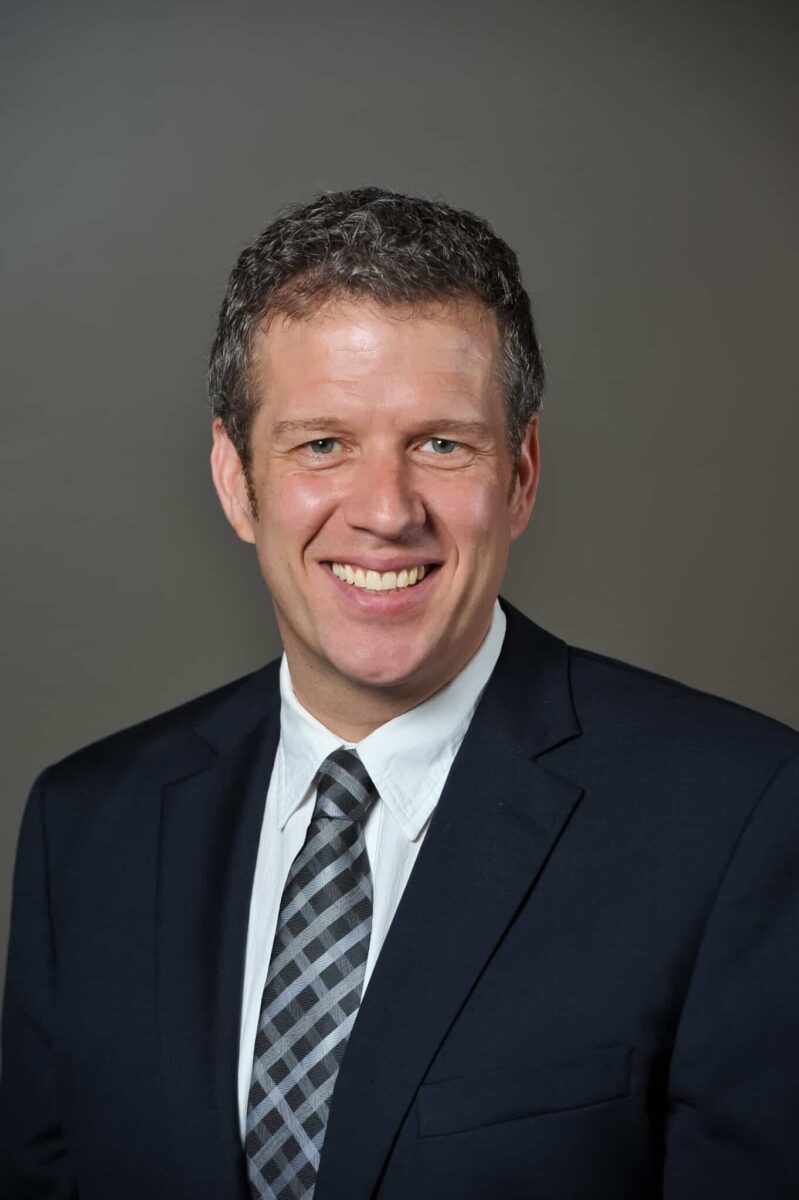
After leading Atlanta’s Alliance Theatre through two major renovation projects, a global pandemic and more than 100 productions over 11 years, Managing Director, Mike Schleifer, will leave the Alliance at the end of the year to become the managing director of Lincoln Center Theater in New York.
As managing director of the Alliance, Schleifer oversees all operational, marketing, financial, fundraising and shared services activities. In his new role, Schleifer will oversee LCT’s financial and operational health and ensure long-term sustainability and growth. He will also work to align strategic planning with artistic goals, manage the theater’s union relationships, lead budgeting, marketing and capital planning efforts and identify and develop new revenue opportunities.
“While it’s rare to find a managing director who is equally brilliant at the operational and financial part of the job, it’s simply unheard of to find one who excels on those fronts and leads with such unabashed heart, vision and humor,” said Jennings Hertz Artistic Directors Tinashe Kajese-Bolden and Christopher Moses in a joint statement.
“For the past 11 years, we had the unfathomably good fortune to have all that and more in Mike Schleifer. Mike’s willingness to bet on our mission and invest in the extraordinary talent of the Alliance staff allowed us to realize aspirational dreams we never would have dared to dream without his encouragement and faith. We’ll miss him daily but cannot wait to witness the joy he’ll bring to the Lincoln Center Theater.”
During his tenure
During his tenure with the Alliance, Schleifer led the administrative and producing teams on over 100 productions and moved four shows to Broadway, including last season’s “Water for Elephants” and this season’s “Maybe Happy Ending.”
He spearheaded the $36 million renovation of the award-winning Coca-Cola Stage and is currently leading the $26 million renovation of the Goizueta Stage for Youth and Families. Under his leadership, the Alliance more than doubled its operating budget, tripled its endowment and continued to lead the country in work developed for young audiences.
“It’s been a true honor and privilege to work, lead and learn at the Alliance Theatre for the last eleven years,” said Schleifer. “I’m deeply grateful to the staff, artists and audiences of the Alliance Theatre and Woodruff Arts Center who have made this journey so rewarding.”
“We’ve achieved remarkable milestones — from moving productions to Broadway to completing transformative capital projects,” he continued. “I’m excited for what’s next, but I won’t be leaving until we cut the ribbon on the new Goizueta Stage for Youth and Families — a project that reflects the Alliance’s deep commitment to the next generation of theatergoers, both with the physical theater space and with the endowment we’re raising to make the work on that stage financially accessible for all.”
Additional roles
In addition to his work at the Alliance, Schleifer serves on the boards of the League of Resident Theatres and True Colors Theatre Company. In 2018 he co-founded Volute Partners, a theatre consultancy focused on capital projects and the subsequent operational support and budgets needed to sustain them.
“We are immensely grateful for Mike’s leadership and tireless dedication to the Alliance Theatre. His vision, passion, and expertise have left an indelible mark on this organization,” said Hala Moddelmog, president and CEO of Woodruff Arts Center.
“We take great pride in seeing him step into this well-deserved opportunity, knowing he will make a lasting impact at Lincoln Center Theater.”
New leadership
The leadership of the Woodruff Arts Center, with support from members of the Alliance Theatre Board of Directors, will conduct a national search for the Alliance’s next managing director, led by executive search firm, Corps Team.
“On behalf of the Alliance’s board of directors, we want to thank Mike for more than a decade of service to the Alliance and Atlanta community,” said Kendrick Smith, Alliance Theatre Board of Directors chair. “He oversaw a period of unprecedented growth with a spirit of collaboration and unwavering commitment to the theater’s artistic vision.”
“As we begin the national search for his successor, we remain dedicated to the theater’s mission of expanding hearts and minds, on stage and off.”
About the Alliance Theatre
Founded in 1968, Alliance Theatre is the leading producing theater in the Southeast, reaching more than 165,000 patrons annually.
The Alliance is led by Jennings Hertz Artistic Directors Tinashe Kajese-Bolden and Christopher Moses and Managing Director Mike Schleifer and is a recipient of the Regional Theatre Tony Award® for sustained excellence in programming, education and community engagement.
In January 2019, the Alliance opened its new, state-of-the-art performance space, The Coca-Cola Stage at Alliance Theatre.
Known for its high artistic standards and national role in creating significant theatrical works, the Alliance has premiered more than 140 productions, including eleven that have transferred to Broadway.
Additionally, the Alliance education department reaches more than 90,000 students annually through performances, classes, camps and in-school initiatives designed to support teachers and enhance student learning.
The Alliance Theatre values community, curiosity, collaboration and excellence and is dedicated to representing Atlanta’s diverse community with the stories they tell, the artists, staff and leadership they employ and the audiences they serve.
For more information, visit alliancetheatre.org.
Related
Around Atlanta
Fantastical Creatures in Fernbank’s WildWoods
Published
2 months agoon
March 5, 2025
Encounter mythical creatures in a natural landscape when “Spirit Guides: Fantastical Creatures from the Workshop of Jacobo and María Ángeles” opens March 29.
Immerse yourself in a breathtaking outdoor exhibit that intertwines Mexican cultures and contemporary art when “Spirit Guides: Fantastical Creatures from the Workshop of Jacobo and María Ángeles” opens at Fernbank Museum.
From March 29 to August 3, guests can enter a supernatural world as they walk alongside towering, brightly colored and richly patterned sculptures in the natural landscape of Fernbank’s WildWoods.
Presented in both English and Spanish, this collection of brightly-colored fiberglass sculptures depicts imaginary hybrid animals and offers visitors an unparalleled journey into an imaginative take on the spiritual landscape of southern Mexico’s Indigenous traditions.
Inspiration and legend
In creating “Spirit Guides,” artists Jacobo and María Ángeles were inspired by an ancient Zapotec stone calendar. Indigenous to southern Mexico, Zapotec culture is deeply connected to plants, seasons and animals.
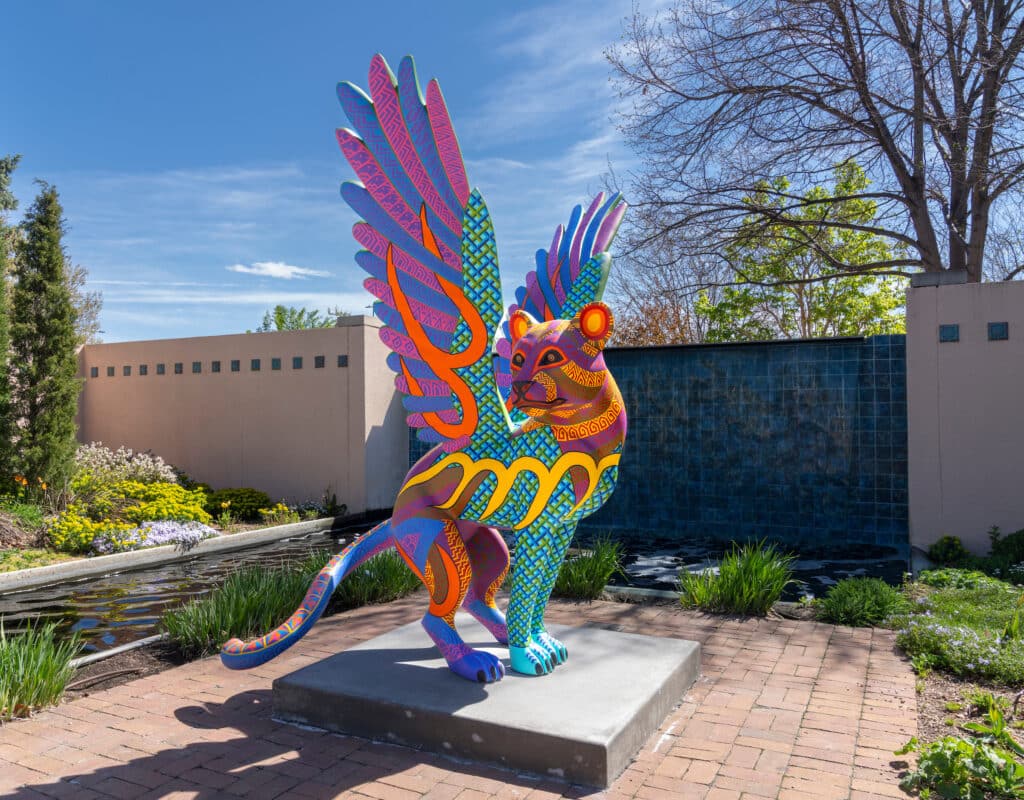
“Spirit Guides” beckons visitors to travel into the spiritual landscape of Mexico’s Indigenous traditions through these animal sculptures that act as both spirit guides and astrological embodiments of human character.
Some of the hybrid animals depicted include a combination of a deer-butterfly or a coyote-fish. These larger-than-life sculptures depict patterns and designs that symbolize different aspects of Zapotec life and culture, such as happiness, fertility and community.
The artists have previously stated that, according to a Zapotec legend, when you are born an animal comes to you to serve as your protector in this world. This animal is your tona, a being that shares your destiny and soul.
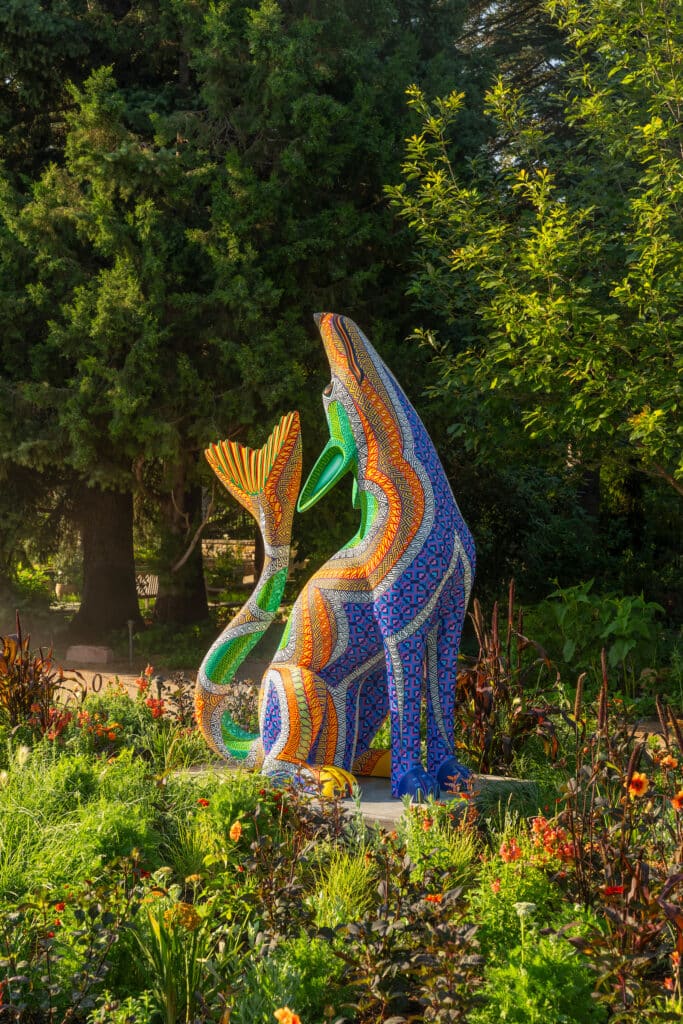
Along with your tona, you also have a nahual, which is assigned based on the year of your birth. This spirit animal embodies characteristics that mirror your own personality.
As guests stand before the sculptures in WildWoods — some of which stand nearly 8 feet tall and 9 feet wide — they are made conscious of the profound connection between the natural and cosmological worlds.
About the Artists
Jacobo and María Ángeles are a married artist team based in Oaxaca, Mexico.
Joyful, fanciful and distinctively patterned, the Ángeles’ animal sculptures embrace both contemporary art and folk-art traditions. They employ and teach more than 100 artisans in their workshop, which has created artworks shown in museums around the world.
Exhibit details
By drawing inspiration from the Zapotec calendar and their own imaginations, the Ángeles team sculpted their own mythical creations.
This exhibit features eight towering, vibrant fiberglass sculptures of hybrid animals, intersecting art, mythology and identity. The sculptures were designed through a multi-step process that included conceptual sketches, small wooden renderings and papier mâché molds before casting the fiberglass.
A team of artisans then helped to paint the sculptures with striking colors and intricate geometric patterns inspired by Zapotec and other Indigenous designs, each with their own unique meaning.
Organized by Denver Botanic Gardens, “Spirit Guides: Fantastical Creatures from the Workshop of Jacobo and María Ángeles” is on view from March 29 – August 3, 2025. The exhibit is included with General Admission at Fernbank Museum and is free with CityPASS.
It will also be on view select nights when the museum is open, including during Fernbank After Dark and Fernbank … but Later.
For more information, please visit fernbankmuseum.org.
Related
Around Atlanta
Fernbank Museum Roars with Excitement for New Exhibit
Published
4 months agoon
January 21, 2025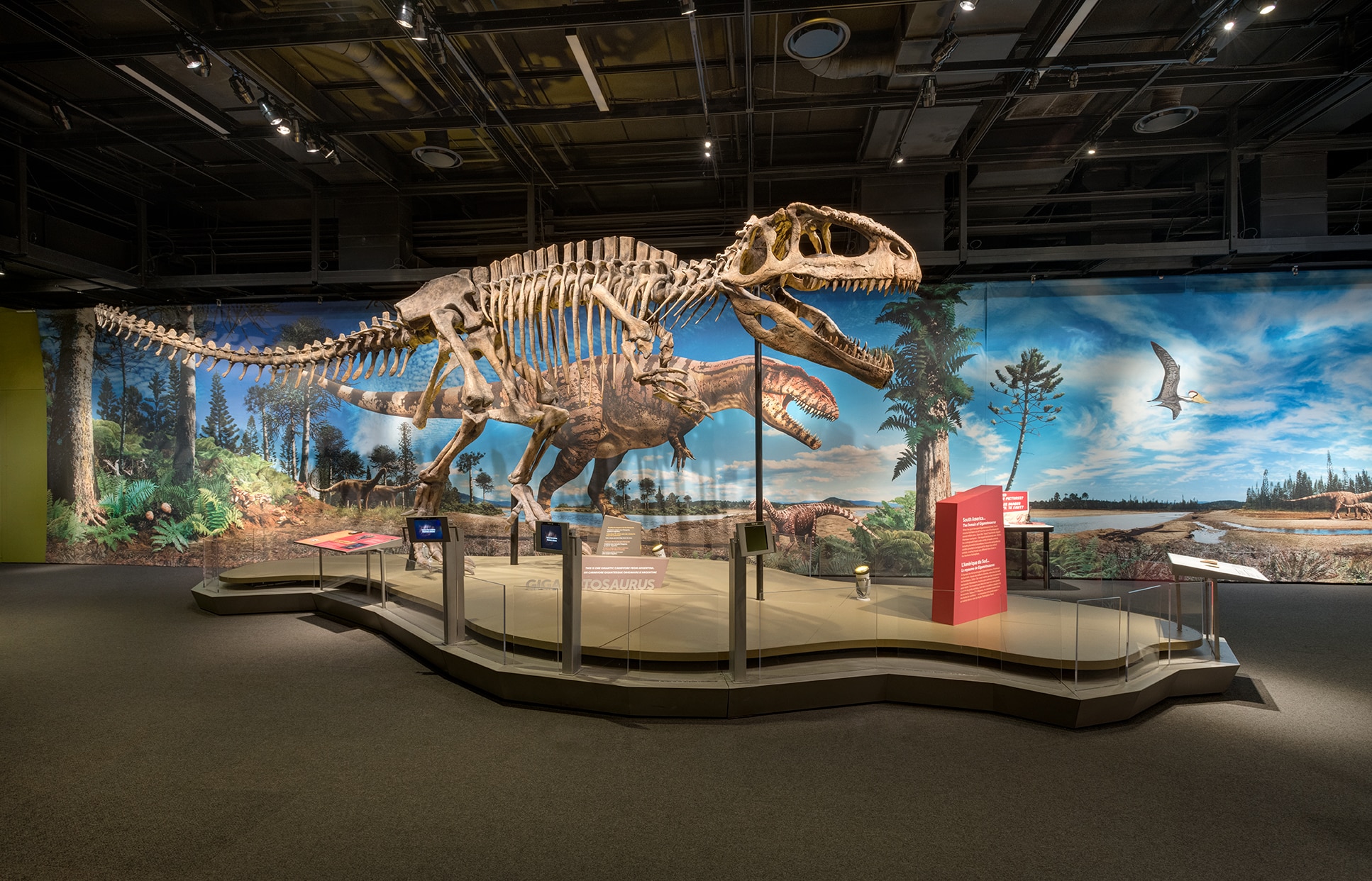
“Ultimate Dinosaurs” will run from February 8–May 4, 2025
“Ultimate Dinosaurs,” a special exhibit that explores the fascinating species that evolved in isolation in South America, Africa and Madagascar, stomps into Fernbank Museum from February 8 to May 4.
Through the exhibit, guests will experience an impressive blend of skeletal displays and augmented reality as they learn about the changing prehistoric landscape of dinosaurs in a new, modernized way.
Journey through the Mesozoic
Based on groundbreaking research from scientists around the world, “Ultimate Dinosaurs” highlights dinosaurs typically unfamiliar to North Americans and seeks to answer the question: why are the unique and bizarre dinosaurs in the Southern Hemisphere so different from their North American counterparts?
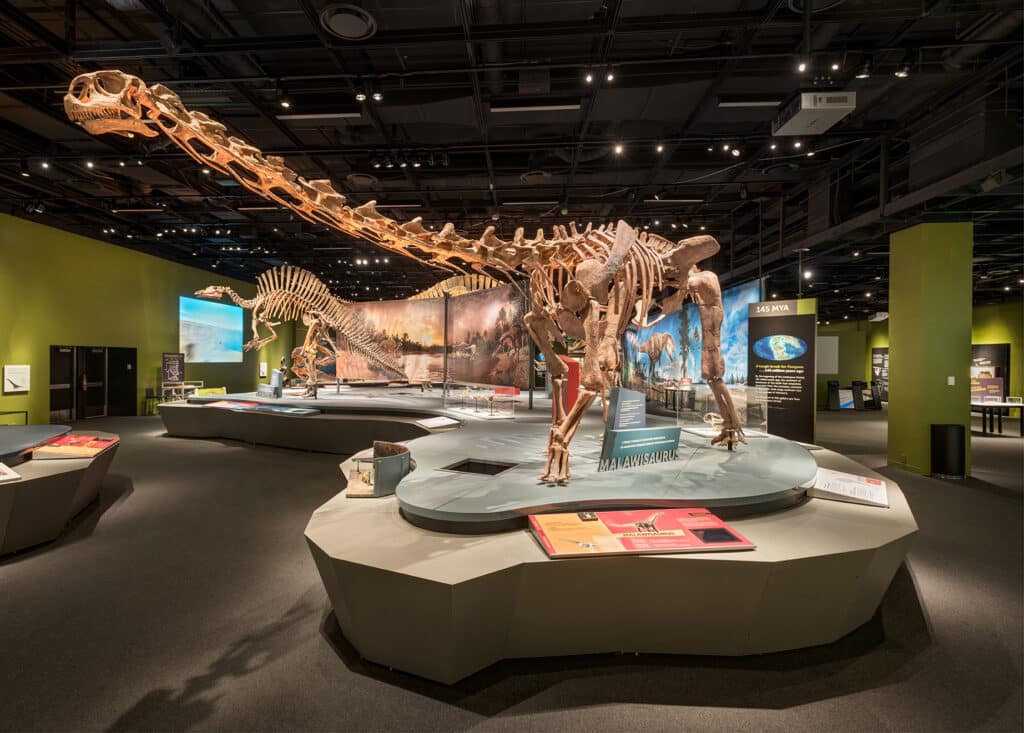
Starting with the breakup of the supercontinent Pangaea, “Ultimate Dinosaurs” takes visitors on a journey through the Mesozoic Era (250-65 million years ago) and shows how continental drift affected the evolution of dinosaurs during the Triassic, Jurassic and Cretaceous periods.
“We are excited to have “Ultimate Dinosaurs” here at Fernbank and explore the unique ways that dinosaurs have evolved in isolation,” said program manager, Maria Moreno. “This exhibit combines rarely seen specimens with interactive stations for patrons of all ages to enjoy.”
“It is also very exciting to have an exhibit highlighting our mascot, the Giganotosaurus, one of the largest land predators to have ever lived,” Moreno added.
Dino displays and hands-on activities
Guests can view a variety of full-scale dinosaur displays from the Eoraptor, Malawisaurus, Suchomimus, Rapetosaurus and more, including 14 dinosaur skeletons. One highlight is the Giganotosaurus skeleton, which is also on view in Fernbank’s permanent exhibit, “Giants of the Mesozoic.”
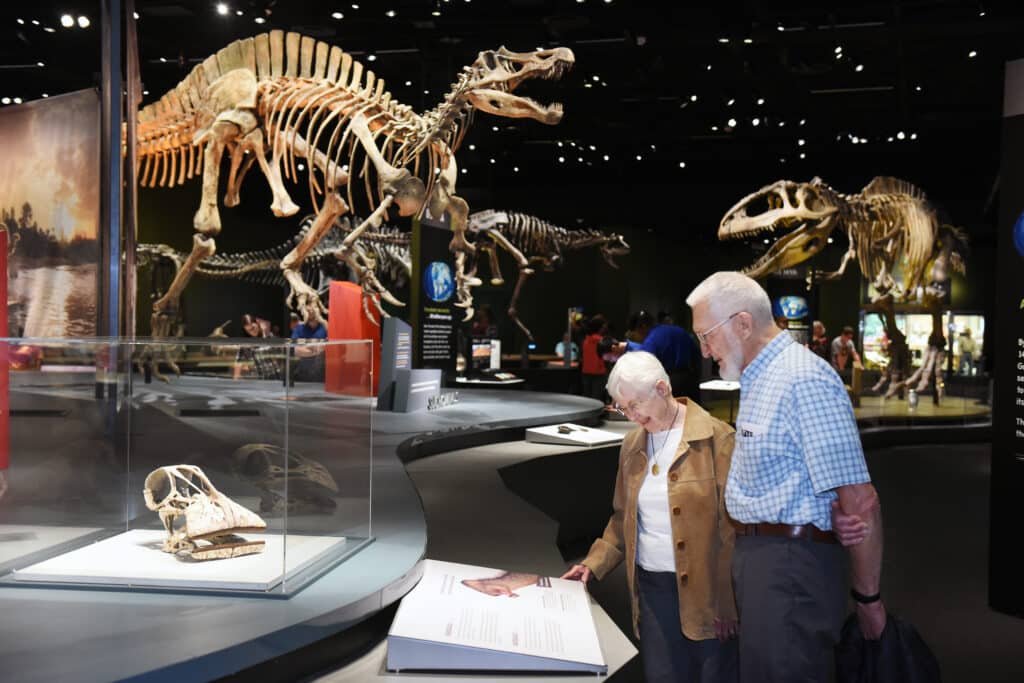
This special exhibit will include several real fossils, some of which will be available to visitors to touch. Additionally, “Ultimate Dinosaurs” features several hands-on activities, one of which involves exploring the physical characteristics of dinosaurs’ stride patterns, crests and frills.
Another activity uses augmented reality to transform intricately detailed skeletons into moving, flesh-and-bone creatures.
Related programming
To celebrate the grand opening of “Ultimate Dinosaurs,” Fernbank is hosting a family-friendly Dino Day on Saturday, February 8 from 10 a.m. to 1 p.m. The event is included with general admission.
Additionally, the giant screen film, “T. REX 3D,” will be showing through May 16.
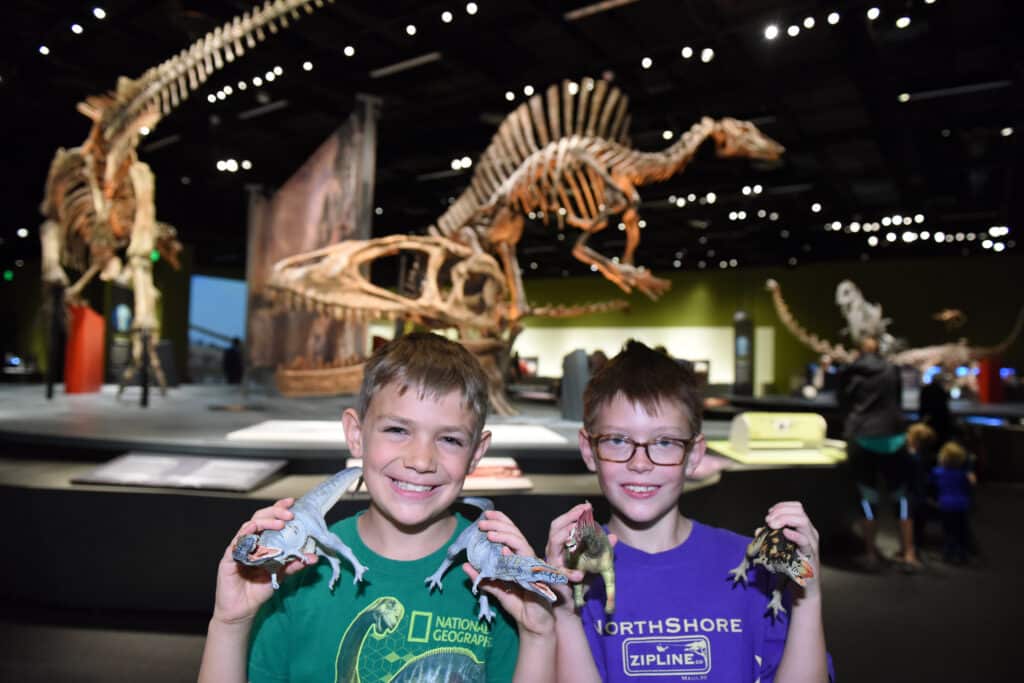
There will also be a lecture with Anthony (Tony) Martin, professor of practice in the Department of Environmental Sciences at Emory University, titled “On Frozen Ground Down Under: Polar Dinosaurs, Insects and other Cretaceous Fossils of Australia” this spring.
The details
Presented by the Science Museum of Minnesota, “Ultimate Dinosaurs” is open at Fernbank from February 8–May 4. The exhibit will be included with general admission tickets and is free with CityPASS.
For more information or to purchase tickets, visit fernbankmuseum.org.
Related
Read the Digital Edition
Subscribe
Keep Up With Peachtree Corners News
Join our mailing list to receive the latest news and updates from our team.
You have Successfully Subscribed!

GA Tech Launches First-of-its-Kind GT Atrium in Peachtree Corners

Katherine Lafourcade — A Journey of Passion, Resilience and Giving Back

Digital Edition

PCBA Announces 2025 Scholarship Winner

Paul Duke STEM High School Student Earns CGO Scholarship

World Blood Donor Day Starts Here: Theo’s Miracle, Katherine’s Mission [Podcast]

Peachtree Corners Grows Business Opportunities Through Economic Development

Executive Function: A Tribute to Working Moms

Simpson Elementary Marks Exceptional Children’s Week

Executive Function: A Tribute to Working Moms

Official City Merchandise Line Debuts This Saturday at Town Green

Peachtree Corners Grows Business Opportunities Through Economic Development

Digital Edition

World Blood Donor Day Starts Here: Theo’s Miracle, Katherine’s Mission [Podcast]

Paul Duke STEM High School Student Earns CGO Scholarship

PCBA Announces 2025 Scholarship Winner

Light up the Corners [Video]

Capitalist Sage: Business Leadership in Your Community [Podcast]

Cliff Bramble: A Culinary Adventure through Italy

Top 10 Brunch Places in Gwinnett County

A Hunger for Hospitality

THE CORNERS EPISODE 3 – BLAXICAN PART 1

Top 10 Indoor Things To Do This Winter

The ED Hour: What it takes to Remove Barriers from Education

Peachtree Corners Life
Topics and Categories
Trending
-
Digital Edition4 days ago
Digital Edition
-
Podcast4 days ago
World Blood Donor Day Starts Here: Theo’s Miracle, Katherine’s Mission [Podcast]
-
Business3 days ago
Peachtree Corners Grows Business Opportunities Through Economic Development
-
Community2 days ago
Executive Function: A Tribute to Working Moms








